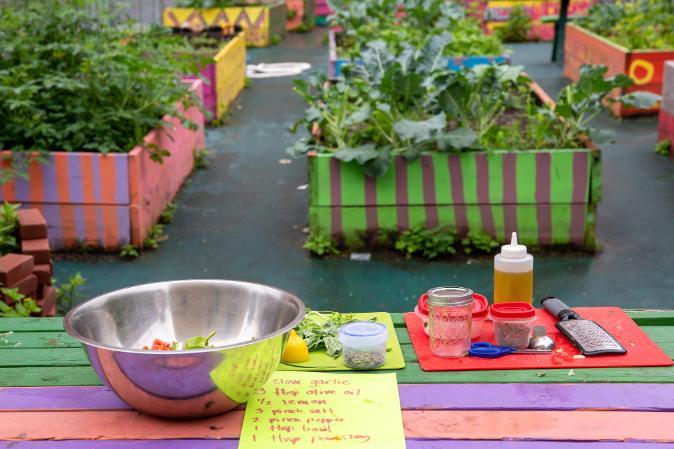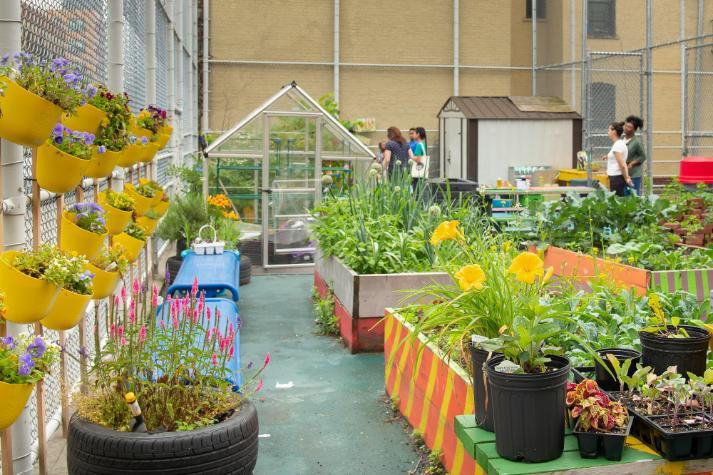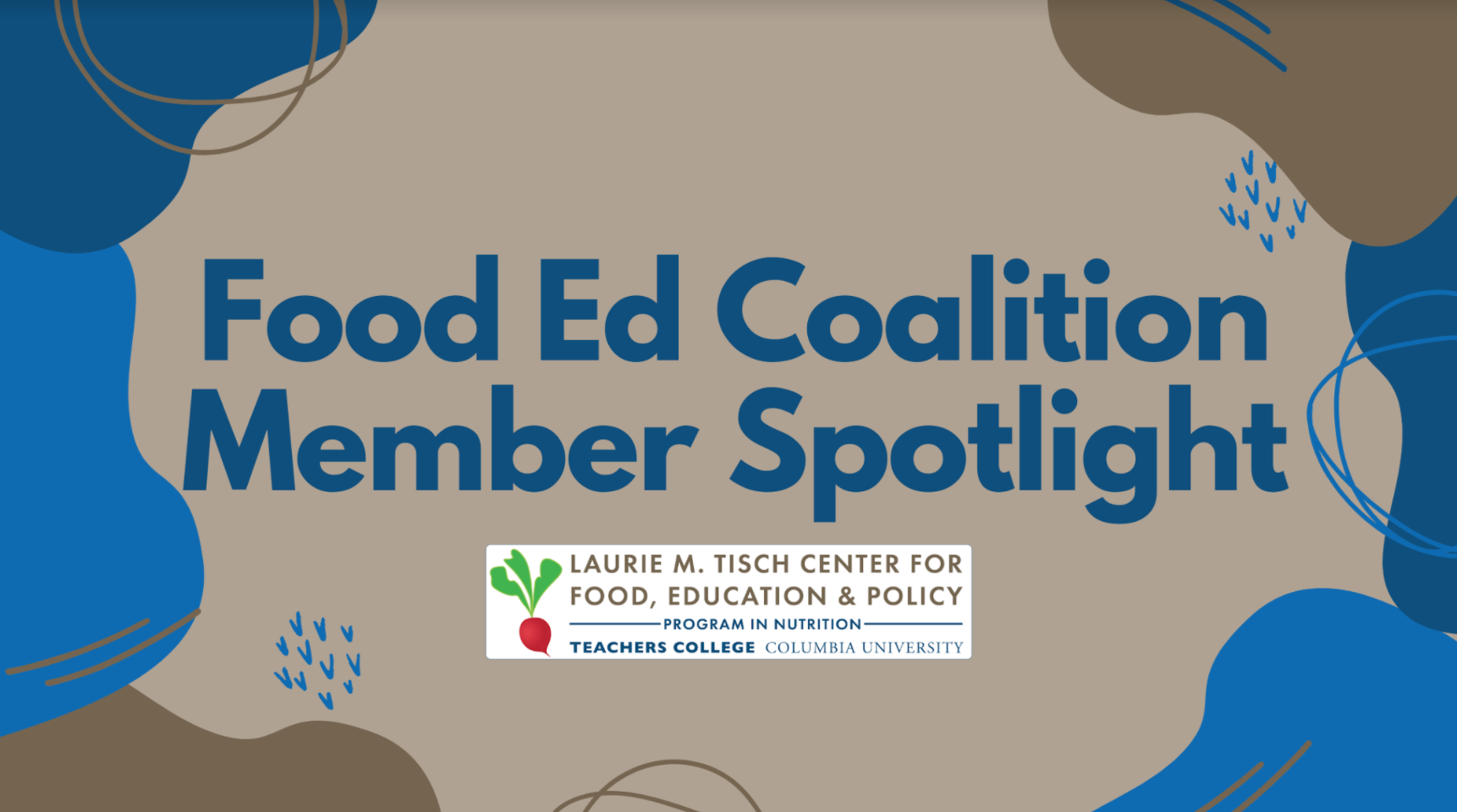The Food Ed Coalition Spotlight Series highlights people and organizations doing amazing work in food education and access in NYC. Find more from the series on the Food Ed Hub.
Quotes have been edited for length and clarity.
Interview with Shanon Morris, Executive Director of Edible Schoolyard NYC.
Can you tell me about your career path and your passions that led you to the Edible Schoolyard?
I am a registered dietitian by trade, which I am extremely proud about. There are not a lot of Brown registered dietitians across the country. I also know there are not a lot of Brown dietitians who are running organizations that are centered around food access or nutrition education. I’m really excited to be in this role and I do feel like my career in the last fifteen years has really prepared me for it. I have worked from being a food banker to youth- and after-school development to writing a children’s book about nutrition education. At the American Heart Association, I really focused my work around implementing policy systems and environmental changes for communities around New York City, with a focus on food insecurity and health equity. All this experience together I feel has really primed me for this big position that I took on as executive director.
One of the things that really excited me about Edible Schoolyard is that we are a small organization which I think was the best step into this new role for me. To be able to work at a smaller organization where I have a chance to talk to everybody, I think that’s so important and something that makes me really excited. I have a program background so I want to be able to read curriculum and give feedback. If we have a workday and we have a donor coming in, I want to get in the garden. Let’s get our hands dirty. I think that’s what makes me strong in my role, and I want to stay connected to everybody who works at this organization because the more inclusive and the closer we are, I think the stronger we’re going to be.
What impact does Edible Schoolyard have on food education practice and policy?
When I think about our organization, I know we are one of the few who are in the school day. We’re not an after-school program, we’re not a train-the-trainer program. We are in the schools, we are embedded in the school system. We’re working hands-on with principals, with school teachers, and we are part of the school community. Some of the information, research, and evaluations that we collect every single year are what others are framing their best practices off of, and we’re very proud of that. One of the ways we share that information is through our professional development programming where we train New York City educators, and educators outside of New York City, on some of the best practices and we share our curriculum. We want to make sure that with a mission like ours - to provide edible education for everybody - that we are indeed reaching as many people as possible. Our program directors can cover many topics like recipes that bring seed to table or bringing a Black history perspective into the garden. Our education is always culturally appropriate and relevant. We do a really good job of working with the organizations surrounding us, not just the schools. I think we do a really good job of connecting those dots within a school and coming together to make decisions, whether that be wellness policies or teachers wanting math to be highlighted in some of our lessons. So the connectivity among the school community is another great way that we build practice.
When it comes to policy, that's certainly an area for growth. We work on a few coalitions, whether that be the Food Ed Hub at TC, and also the New York City Food Policy Alliance. We do our best to stay tapped in, to advocate, to lobby, to speak up at hearings as much as we possibly can. We know that in order for our mission to really happen, to have edible education available for everybody, this has to be something that’s overall policy for the whole New York City public school district. I think we could be doing more and we’re going through a strategic planning process right now, which launches next week. I think that this will be a big pillar that comes out, how can we be doing more in this space? We know we can’t do it by ourselves and that’s where that connectivity comes back into play.
What does a typical lesson by Edible Schoolyard look like?
Something that I love about our lessons is that they are always changing. Most schools are never doing the same lesson at the same time. It’s for our teachers and our program managers to have that finger on the pulse to say what’s going on in the community, what’s relevant for folks. It’s not cookie-cutter, that’s not what food is and our kids are all very different. One thing I love about our curriculum is there is always a part in the beginning that is just a check-in: how are you doing? I saw a statistic the other day that said that something along the lines of “kids are given permission to speak 18 minutes in the school day outside of the free lunch period” 18 minutes is such a small number right? So when I think about our work being hands-on in the kitchen, making a recipe, or being in the garden, I think about kids being able to talk and to express themselves and to develop opinions, and to have fun. We know that those aspects of learning, help learning and help them adopt healthy changes. It really resonated with me that we’re doing the work that kids really need to thrive in the school day. Our lessons are amazing.
Two pillars that really stand out to me are: cultural responsiveness, and social-emotional learning. We always have a culturally responsiveness category to say how the lesson is tapping in when it comes to culture. We always make sure we’re checking off those two categories and making sure that’s a big takeaway for our kids every single time. We talk to kids from seed to table, they could be out in the garden planting a seed, or picking a fig. As I went to class on Friday they were making apple tree hats. The kids were drawing their apples and they started coloring the apples in different colors and noting that not all apples are red. And I was like okay, they're paying attention, they’re listening – all apples are different. The last thing that stands out is our classes are really fun! I know that they’re having so much fun and they’re having a voice and just enjoying their time learning about something we all connect with, and that’s food.

How can people support your work right now?
There are a few ways people can support our work. The top few would be to head to our website, esynyc.org, and you can make a gift. It can be a monthly donor, it can be one time, but every dollar counts so we would love to see more folks giving in that way. You can tap into our newsletter which you can sign-up for on our website as well. We have an interesting journey to follow, so we hope that folks will follow along on Instagram and stay tapped in.
The last one that people undersell is talking about our work. If you feel aligned, if you feel this work is important, talk about it. Spread the word. Certainly the old school method of marketing – just tell your friend. It goes back to the connectivity piece too, the more we work together and the more we all talk about our work – it all comes together. So another way to support our work is to share our mission with somebody you think would be aligned with it.
What advice would you give to someone looking to get involved in food access, food policy, or sustainable food system work?
Talk to the people who are doing this work already. I think sometimes we all think we have the next big idea and we don’t realize there have been people in the field who have been doing it for a long time. The more we’re connected, the more we’re listening to each other, the better. If someone were coming in new, I’d give them the top ten people they should chat with and get to know, as they get on their way and encourage them to stay connected and join some coalitions. We’re only going to be as strong as the people we have with us. I would want them to get connected and listen. We’re all learning and we’re all trying to do it in a better way.
If I had one more tip to give, stay community-centered. Talk to the partners but also talk to the community. You can’t solve problems without understanding where the community is and what their needs are and what they’re looking for. I certainly want to make sure they’re not just talking to partners but they’re super connected to the community and what their needs are. And do they [the community] need to be a part of the decision-making process. Do I need to have someone from the community on the board? I think we overlook that opinion very often.
What does the Edible Schoolyard look like 5-10 years from now in terms of the work they are doing and the communities they are working with?
I hope that we are at a better place when it comes to policy where edible education is embedded within the school, where the Edible Schoolyard is being used to show best practices and show innovation for different organizations and different school systems. I’d love to see us play a bigger role when it comes to community building. I do think we play a strong role when it comes to connectivity but how can we support the community initiatives that are needed and I think Covid really highlighted that with food access work. How can we play a bigger role in that space and how can we ensure our families are taken care of? We’re a small organization but we have a huge impact when it comes to how deeply rooted we are in our work so I’d love to amplify that. I’d love to see us in more schools and I’d love for our professional development to be bigger and broader.
And lastly, I’d love to see the organization continue to thrive as an anti-racist organization. Like many, we have work to do when it comes to diversity, equity, and inclusion. I want to make sure that in five to ten years that we are in a stronger place and that we’re continuously learning because no one is ever going to be 100% right. We have to keep on evaluating and changing with it. So I look forward to our organization continuing to be comfortable in that space and thriving in that area. But all in all, best-case scenario, policy has passed and we’re talking about innovation, not necessity anymore. I think that would be a huge shift.

